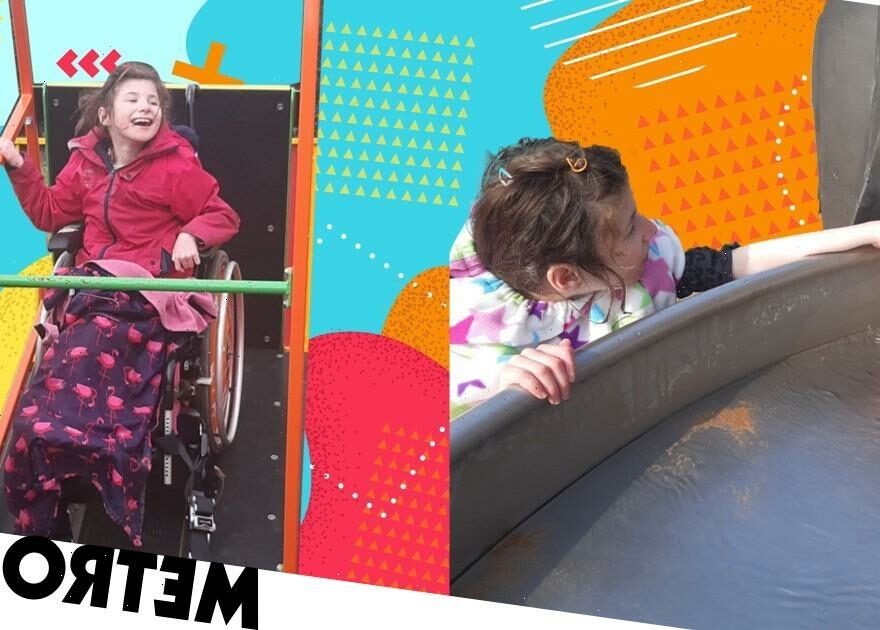Disabled children are getting hurt in local playgrounds, according to new research.
8% of children in the UK are disabled – but a study conducted by disability equality charity Scope has found that one in ten parents said their disabled child hurt themselves because of inaccessible playground equipment.
This is true for 12-year-old Emily-May, who is non-verbal and a wheelchair user due to having a rare developmental condition called Baraitser-Winter syndrome.
Mum, Lorna Fillingham, says there is hardly any equipment that Emily-May can use, and when they do find something she likes, they use it until they ‘can’t anymore.’
‘When we went to a park recently, there was only one piece of equipment my daughter could use,’ says Lorna. ‘But she wanted to play so desperately that she sat in it and spun until she made herself sick.’
Until Emily-May was six or seven, Lorna would put her in the toddler swings, as often there was no other equipment she could use.
‘It meant that she had to be in the little kids’ area, where the equipment wasn’t the right size and might not have held her weight,’ Lorna says.
‘She also couldn’t interact with kids her age. But [the swings] were all she could go on.
‘When there isn’t wheelchair friendly equipment, I have to physically lift her on and off basket swings, which can be difficult. I’m worried about hurting myself or dropping her.
‘I know that one day I won’t be able to lift her anymore, and then there will be no play options and that is heart-breaking. She deserves to be able to play too.’
The latest findings, released to coincide with Child Safety Week – June 6-12 – found that many parents and carers do not feel their disabled child is safe using playgrounds with inaccessible equipment, with some parents saying their child had been hurt because the equipment was not suited to their needs.
The survey of 1,000 parents and carers of disabled children found that many children are being ‘denied fun, friendship and development opportunities, leaving many families isolated and excluded.’
While one in ten parents of disabled children said they did not feel their child was safe using the inaccessible equipment.
‘The fact that some parents do not feel their disabled child is safe in playgrounds is extremely alarming,’ says Emma Vogelmann, Lead Policy Adviser at Scope. ‘Many playgrounds aren’t designed with disabled children in mind.
‘For example, many have woodchip or sand floors that may be difficult for children with wheelchairs or walkers, and concrete floors are dangerous for children prone to falling.
‘Every child has an equal right to play. Yet many disabled children can’t enjoy their local playground because the equipment isn’t designed for them. It leaves disabled children shut out and missing childhood experiences.’
Parents have also anonymously shared their children’s experiences and have offered tips on how playgrounds can become more accessible.
‘Simple measures like tactile flooring would help my blind daughter know where the danger zone around the swings is. This would benefit all children,’ one parent wrote.
‘It would also be useful to have high contrast colours on climbing frame bars, but not yellow, which is particularly difficult to see in sunlight. Footholds that are not slippery would also be great, so [my daughter] has a fighting chance to climb up despite her cerebral palsy.’
These findings mark the launch of Scope’s new campaign, Let’s Play Fair, which demands that every child has an equal right to play.
It aims to ensure that leisure and play spaces are more inclusive, giving disabled children and their families more choice and control over how and when they engage with them.
They have an open letter calling on the Government to ‘make play fair for disabled children’, which has reached over 11,000 signatures in just two weeks.
‘We’re calling on the government to create an Inclusive Playground Fund,’ says Emma. ‘So that councils can work with disabled children and their families to design playgrounds that work for them.’
Do you have a story to share?
Get in touch by emailing [email protected].
Source: Read Full Article


